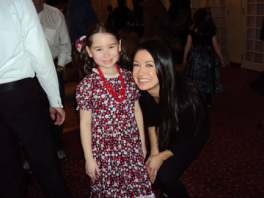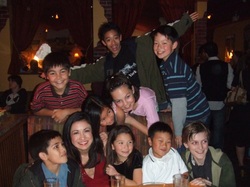
Equity & Inclusion:
Because of my background and experiences, diversity, equity, and inclusion in the classroom are at the forefront of my mind. I believe representation matters and it is important for students to be able to see their possible selves within the teacher. I believe there is a huge equity gap, and I need to do my part to help underrepresented students to the best of my ability. My goal as a choir teacher is to help students connect to music in a way that personally matters to them.
The Student:
My beliefs align with the constructivist learning theory, that students construct knowledge rather than passively take on information. I believe all children have the ability to learn and it is up to teachers to reach them. As a culturally responsive teacher, I will embrace my students’ diverse backgrounds and challenge them to be critical thinkers in music and society. I want my students to be successful and relevant musicians beyond my classroom!
Caring, Communication, and Self-Reflection:
I believe that caring goes beyond getting to know each student, but also holding students accountable for their own learning. My hope is that students become independent thinkers in music so they will continue to participate in music after high school. I believe the ability to communicate with students is essential in their learning process and educators must understand content on a deeper level. If a teacher cannot clearly communicate what students should be learning, then students will not be able to communicate what they are comprehending. As a lifelong learner, I believe in self-reflecting as a teacher and seeking ways to better myself as an educator.
Because of my background and experiences, diversity, equity, and inclusion in the classroom are at the forefront of my mind. I believe representation matters and it is important for students to be able to see their possible selves within the teacher. I believe there is a huge equity gap, and I need to do my part to help underrepresented students to the best of my ability. My goal as a choir teacher is to help students connect to music in a way that personally matters to them.
The Student:
My beliefs align with the constructivist learning theory, that students construct knowledge rather than passively take on information. I believe all children have the ability to learn and it is up to teachers to reach them. As a culturally responsive teacher, I will embrace my students’ diverse backgrounds and challenge them to be critical thinkers in music and society. I want my students to be successful and relevant musicians beyond my classroom!
Caring, Communication, and Self-Reflection:
I believe that caring goes beyond getting to know each student, but also holding students accountable for their own learning. My hope is that students become independent thinkers in music so they will continue to participate in music after high school. I believe the ability to communicate with students is essential in their learning process and educators must understand content on a deeper level. If a teacher cannot clearly communicate what students should be learning, then students will not be able to communicate what they are comprehending. As a lifelong learner, I believe in self-reflecting as a teacher and seeking ways to better myself as an educator.
On-going Assessment:
The only way to identify student progress is through assessment. Reviewing student work is an important way of assessing student progress toward curricular goals and identifying desired changes in instructional practices. The use of on-going assessments allow me to make improvements in my instruction and be more responsive to student learning. Keeping assessments and portfolios of student learning is also important for keeping communication open so students know where they stand in terms of grades. Assessments communicate that I take my job and their education very seriously.
Social-Emotional Learning:
I believe social emotional learning in a classroom is vital to classroom management and learning. Not only will I teach students subject matter, but I will teach them how to work together and be empathetic towards each other, as this is a necessary skill in the real world. My hope is by practicing collaboration and self-regulation in the classroom, students will learn to work together to manage their own behavior. I believe that the educator must act as leader and set boundaries to help students feel safe, which is necessary in order to create an exceptional environment for learning. My goal is to make a safe space for my students to open themselves up to learn and trust the ability within them. I also believe we have a duty to teach our students to be compassionate members of society and will consistently practice this in my classroom.
Growth Mindset...
I believe it is very important for a teacher to stay current and relevant in their field by being a self-learner. I will do this by becoming an active member within the PLC and music education organizations in the area. As a daily role model for my students, I must embody a growth mindset and show up to work each day with a positive attitude about life and learning, present myself in a professional manner, and work as a team within my students’ learning communities.
The only way to identify student progress is through assessment. Reviewing student work is an important way of assessing student progress toward curricular goals and identifying desired changes in instructional practices. The use of on-going assessments allow me to make improvements in my instruction and be more responsive to student learning. Keeping assessments and portfolios of student learning is also important for keeping communication open so students know where they stand in terms of grades. Assessments communicate that I take my job and their education very seriously.
Social-Emotional Learning:
I believe social emotional learning in a classroom is vital to classroom management and learning. Not only will I teach students subject matter, but I will teach them how to work together and be empathetic towards each other, as this is a necessary skill in the real world. My hope is by practicing collaboration and self-regulation in the classroom, students will learn to work together to manage their own behavior. I believe that the educator must act as leader and set boundaries to help students feel safe, which is necessary in order to create an exceptional environment for learning. My goal is to make a safe space for my students to open themselves up to learn and trust the ability within them. I also believe we have a duty to teach our students to be compassionate members of society and will consistently practice this in my classroom.
Growth Mindset...
I believe it is very important for a teacher to stay current and relevant in their field by being a self-learner. I will do this by becoming an active member within the PLC and music education organizations in the area. As a daily role model for my students, I must embody a growth mindset and show up to work each day with a positive attitude about life and learning, present myself in a professional manner, and work as a team within my students’ learning communities.

The Music Classroom
It is important that students learn the fundamentals of music so they can become independent musicians beyond the classroom. Choir students will learn proper posture and technique for making music, gain music theory knowledge, while learning familiar and new songs. The classroom will be a safe and creative environment where students will be encouraged to take musical risks and embrace the music making process.
It is important that students learn the fundamentals of music so they can become independent musicians beyond the classroom. Choir students will learn proper posture and technique for making music, gain music theory knowledge, while learning familiar and new songs. The classroom will be a safe and creative environment where students will be encouraged to take musical risks and embrace the music making process.
